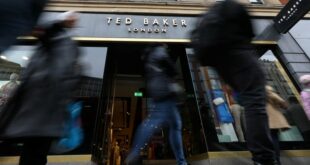Former privacy commissioner says it puts customers at risk of identity theft; Amazon says it’s investigating

Ottawa resident Arthur Stewart said he was "surprised" and "concerned" to learn a package he returned to Amazon's fulfilment centre in Mississauga, Ont., was recently being sold at a liquidation store in Toronto — with the shipping label showing his full name, home address and phone number clearly visible.
"I have no issue with the fact that Amazon or any other retailer would be able to resell things that are returned or things that don't get sold," Stewart said in an interview.
"My issue is that they aren't taking adequate steps to protect the privacy of people."
He's one of several Amazon shoppers CBC identified whose returned items were being sold at Toronto liquidation stores with their personal information still clearly visible on the packaging — putting them at risk of identity theft, a prominent privacy expert says.
A CBC Toronto investigation found the personal information of three dozen people on display at two locations of liquidation retailer Top Binz.
Top Binz, which has two stores in Scarborough and another in Thornhill, buys truckloads of returned and overstocked items from Amazon and other online retailers through a distributor, reselling them to the public at low prices.
WATCH | Tech repair shops caught in privacy breaches:

Testing tech repair: who's spying on you?
2 months ago
Featured VideoWe load up smartphones and laptops with private information to find out if technicians will snoop on our devices. We reveal who looks at our stuff and what you can do to protect your privacy.
Top Binz says, going forward, it will check to ensure all personal information is removed from the products it sells.
But a former provincial privacy commissioner says the situation raises concerns about how online retailers like Amazon — as well as the other companies involved in the liquidation of returned items — are handling personal data.
The current federal privacy commissioner's office says it will look into the issue, while Amazon says it's launching an internal investigation of its own.
36 names, addresses on display
CBC Toronto visited two Top Binz locations in November after a customer raised privacy concerns.
Inside the stores, customers sift through bins filled with all kinds of consumer products, from children's toys to household goods to electronics. Products are displayed out of the box, in original product packaging or in delivery boxes, some with shipping labels still intact, and are sold at flat-rate prices.
Of the 36 items labelled with personal information that CBC Toronto found inside Top Binz stores, two-thirds were linked to Amazon. The remaining third had shipping labels with personal information visible, but it was unclear to which retailer the item was returned.
CBC Toronto reached out to several shoppers whose contact information was visible.
"I've got a lot of privacy concerns," said Ken Bachmeier, a Kingsville, Ont., resident who recently returned a TV stand purchased through Amazon.
"I don't like it … having the information out there for anybody to access," Bachmeier said.
"These people that are out there, they can find out a lot of things with a little bit of information."
It's not just Amazon products ending up at liquidation stores.
Teresa Coppens' name, address and phone number were visible on a box bearing the name of a company that sells Dutch plants and flower bulbs.
"I've heard lots of horror stories about your personal identity being abducted … and that kind of stuff always worried me," said Coppens, who lives in Millbrook, Ont. "It just never dawned on me that resellers would be keeping that information for everyone to see."
In general, federal privacy legislation requires organizations to get consent before collecting personal information and disclosing it to third parties, and to dispose of it when it's no longer needed.
Exposing personal identifiers such as home addresses is a privacy breach that can leave customers open to identity theft, said Ann Cavoukian, who served three terms as Ontario's information and privacy commissioner.
"Anyone should know in this day and age that personal identifiers linked with anything without their consent, which is obviously the case here, can cause, at times, unbelievable harm to those individuals, beyond just the invasion of privacy," said Cavoukian, who is now executive director of the Global Privacy and Security by Design Centre.
"Don't do it, especially if you're a big company like Amazon. You should know better."
WATCH | Retailers caught sharing customer data with Meta:

More Canadian retailers caught sharing customer data to Meta
10 months ago
Featured VideoA CBC News investigation has found the practice of sharing customer data to Facebook’s parent company, Meta, without their consent is more widespread than previously thought. The list of Canadian retailers doing so includes Lululemon, Hudson's Bay and Best Buy.
Amazon launching internal investigation
Top Binz owner Amjad Atieh said he buys 60,000 to 80,000 returned and overstock products per week from two suppliers that get their stock directly from retailers like Amazon, Walmart, Best Buy and Costco.
The industry has grown alongside the rise of online shopping.
While there's not much Canadian data available, and Amazon declined to share its return numbers, online shoppers in the U.S. returned more than $212 billion worth of goods in 2022, representing approximately 16.5 per cent of all online sales that year, according to the National Retail Federation.
Items whose value decreases once they're returned can be expensive for Amazon and its third-party sellers to manage, according to Omar Fares, a lecturer in the retail management department at Toronto Metropolitan University.
"Every hand that touches the product is a financial loss," Fares said. It can also be logistically challenging to manage returned inventory, he said, and "in some cases, you're better off getting rid of it, even at a potential loss."
Atieh said Top Binz receives items from its suppliers on skids and re-sells them "as is." He wouldn't disclose the suppliers' names.
"Usually if we find something [with a shipping label], we take it and we throw it out," Atieh said.
"You can't check every single box."

Following inquiries from CBC Toronto, Atieh said going forward, he planned to hire more staff to ensure personal information is removed from items before they are sold.
Amazon sells returned merchandise on its website via a platform called Amazon Warehouse. It also sells large pallets of returned items to liquidators.
Spokesperson Barbara Agrait said the company has contracts with "reputable liquidators" that require them to remove customers' personal information before re-selling, as well as "robust processes" and regular audits to ensure compliance.
"Our expectation is that our partners remove customer personal information before any resell, and we're disappointed to learn that may not be happening," Agrait said. "We've launched an internal investigation into this matter and will take appropriate actions based on our findings."
Vito Pilieci, a spokesperson for the Office of the Privacy Commissioner of Canada, said the federal watchdog hasn't received any complaints about the personal information of online shoppers being on display at liquidation stores. However, Pilieci said the office would be reaching out to Amazon for more information.
*****
Credit belongs to : www.cbc.ca
 MaharlikaNews | Canada Leading Online Filipino Newspaper Portal The No. 1 most engaged information website for Filipino – Canadian in Canada. MaharlikaNews.com received almost a quarter a million visitors in 2020.
MaharlikaNews | Canada Leading Online Filipino Newspaper Portal The No. 1 most engaged information website for Filipino – Canadian in Canada. MaharlikaNews.com received almost a quarter a million visitors in 2020.







